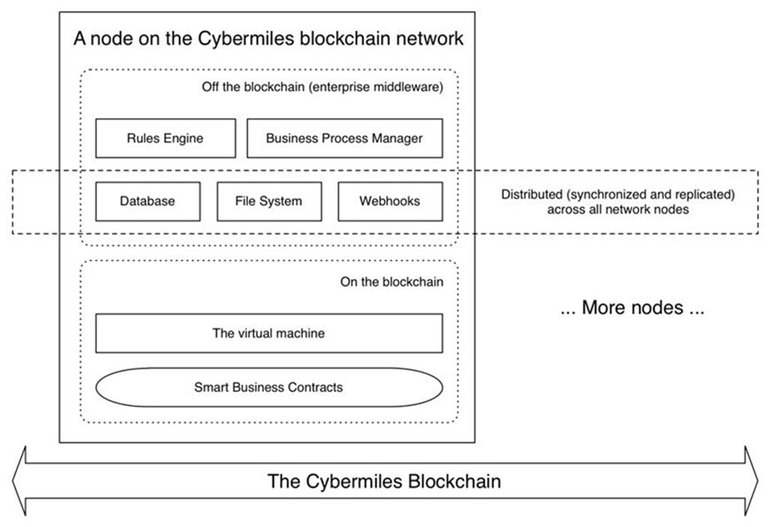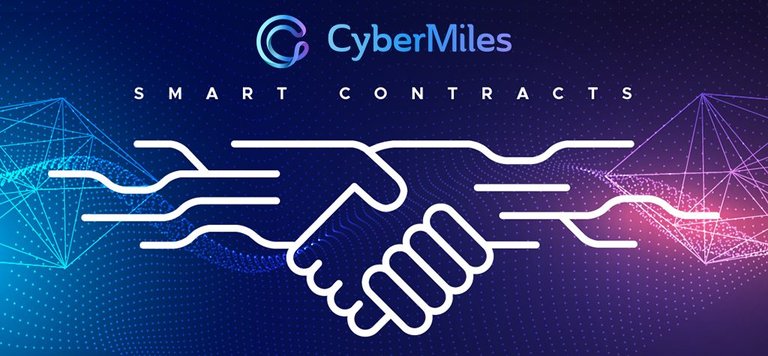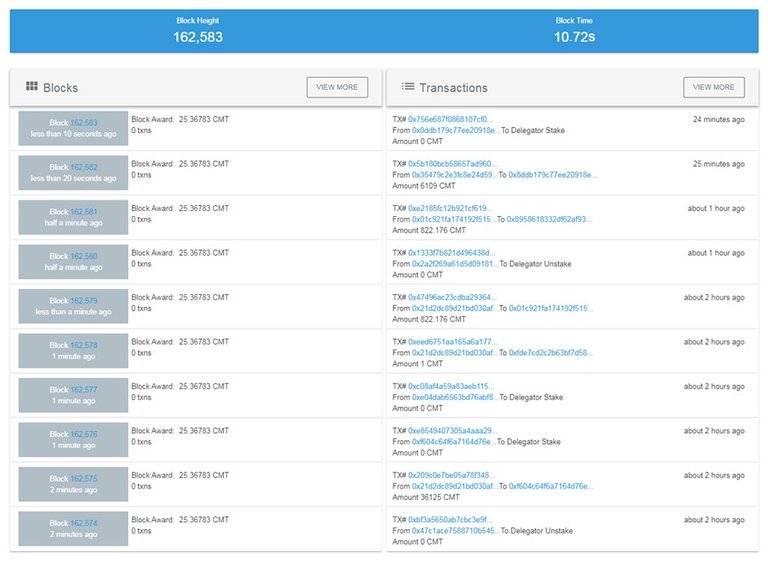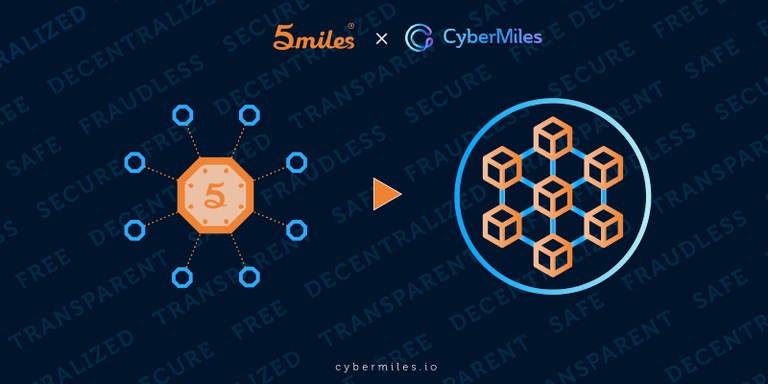CyberMiles (CMT) is a project that receives great attention from the crypto community. In particular, after the main-net event, many questions were raised around this project. In today's article, we to learn what CyberMiles is, how it works, where to store CMT storage wallets and what are the most cheap, safe and reputable trading deals?
What is CyberMiles?
CyberMiles is a blockchain application project in e-commerce field. The goal of the project is to optimize blockchain technology to open a new era for e-commerce in particular and market-online (online market) in general based on the advantages of blockchain technology.
CyberMiles focuses on building an application layer to combine with the blockchain smart contract to create "smart business contract" (smart contract for trading, trading, exchange).
CyberMiles issues its own token called CyberMiles Token (CMT). Future CMT is expected to be used as a primary token for all DApp (distributed applications) or smart business contract developed on the blockchain platform of CyberMiles.

Status of e-commerce environment
Why do we need a new e-commerce platform? Are platforms such as Amazon and eBay running poorly at providing products and services to users?
Undoubtedly, Amazon is proving to be an excellent service platform in providing affordable prices to consumers. In addition, it is also a platform that is easy to use and works well in the past. The problem is that Amazon can do so well, with competitive costs and innovative services because no one challenges Amazon's dominance in the e-commerce industry so nothing continues to guarantee. it will one day provide poor quality or unqualified customer service on its current technology as well as not innovate in the way it delivers products. In addition, it is difficult for other e-commerce brands to find niche niche markets in order to create a foothold and provide a unique product or service.
This giant seems to have captured the entire market share and their e-commerce brand has become more valuable as their reach and coverage increase. In addition, these services also benefit from strong network effects and promotions so that they continue to increase user base at any cost to eliminate competitors. This is especially true because information about markets and shoppers is exclusive. Each e-commerce company manages its own payments, transactions and customer service.
However, every day these problems are changing. What will happen if the market itself is managed by a distributed model. You can make transactions, make payments, resolve disputes and make contracts based on smart contracts. That will absolutely be a new environment for anyone in the e-commerce market.
This is also the vision of CyberMiles, they want to replace Amazon with a library of smart contracts that any e-commerce provider can use. Whether the project will be successful or not is still a question that takes time to respond because currently centralized systems still provide some benefits such as faster processing time and processes. Concentrated dispute resolution. However, creating an open e-commerce platform is a new application where blockchain technology is used to eliminate an intermediary organization.
Project idea
The idea of CyberMiles comes from the problem of centralized management in the field of e-commerce such as product advertising, payment, dispute resolution, etc. CyberMiles believes that blockchain technology with decentralization can help solve. This problem is more economical and efficient.
Existing blockchain of Ethereum has some limitations:
- Slow transaction processing speed is not suitable for e-commerce with huge transaction volume
- Creating smart contracts on Ethereum platform is too complicated for e-commerce users.
- CyberMiles develops a new blockchain platform with the following improvements:
- Support users to create smart business contracts easily.
- Manage personal information, transactions of users safely.
- Use the Delegated-PoS consensus protocol instead of Ethereum's PoW to speed up transactions.
Project 5miles and CyberMiles fund
CyberMiles has a lot of significant success in fact and in particular they have operated a commercial platform for users within a 5-mile radius. 5miles is one of the top 10 most popular e-commerce applications in the United States. It has a total of 12 million users and is estimated to have about $ 3 billion in annual revenue.
If 5miles can even serve only a fraction of that $ 3 billion in CMT, that could be a great benefit for this token and for e-commerce ideas on the blockchain platform. However, operating a platform at such a scale also comes with significant challenges. If the 5miles application successfully migrates to a model based on the blockchain platform, it will be one of the largest enterprise applications on blockchain so far.
And in the process, the CyberMiles management fund, the nuclear agency, will be responsible for bringing success to CyberMiles project. This is a non-profit organization based in Hong Kong. Their goal is to promote the development and widespread application of CyberMiles protocol.
CyberMiles aims to solve two main problems in blockchain e-commerce space:
Problem about: Volume of transactions
If you intend to build an e-commerce site on the blockchain platform as a distributed dapp application then you can choose the Ethereum platform. Ethereum is the dominant factor in the world of decentralized applications. However, for a large-scale e-commerce application, Ethereum may not be the right solution because the platform is having a major challenge that is the transaction throughput.
The current E5miles ethereum network can handle a maximum of 10 transactions per second. This could be improved when the network deployed Casper algorithm. However, to date, large-scale applications when approaching the Ethereum network have encountered these painful problems. Even transactions from the Cryptokitty application have crippled the Ethereum network. Imagine an e-commerce site with 15 million users will create a huge volume of transactions on the Ethereum network and could cripple this blockchain network.
Solution: Algorithm for mining by shares
CyberMiles' answer to this challenge is to create their own blockchain platform with a high throughput consensus mechanism. The goal of the project is to allow thousands of transactions per second as the size of this protocol. In addition, the fast transaction confirmation time will also lead to the rapid purchase and sale of products and services on the platform.
In order to do so, CyberMiles implemented a new algorithm that was exploited by shares of members. This means that individuals can hold a certain number of CMT collateral as collateral in exchange for the opportunity to participate in the process of confirming transactions in a new block on the blockchain. These validators will form a group of shareholders with voting rights and affect the consensus in creating new blocks.
Algorithms for mining by shares may have a much higher throughput than the capacity extraction algorithm. In addition, the bad factors in the block validation process if making wrong decisions or harming the network will be punished by all mobilized shares.
In contrast, when they become honest truthers, the network will give them rewards for the work they have done by participating in the process of creating new blocks. In CyberMiles, this ROI rate is set at 8%, this is a relatively high rate for the algorithm to exploit shares of members. It would be interesting to observe the process of operating the decentralized economy on the blockchain platform that CyberMiles will participate in.
The problem of the complexity of contracts
Another major problem when implementing e-commerce solutions on the blockchain is the complex nature of the components involved in the system. CyberMiles believes that writing a smart contract is not necessarily a difficult and complicated job. However, the e-commerce market is inherently a complex market, in addition to the complexity of the challenges of developing it on the blockchain platform will be able to create potential mistakes and risks.
We also see that the most popular e-commerce platforms are now open source and include everything from user interfaces to product databases to ensure security for information. Private payment. Each of these functions comes with dozens of other functions and will need its own smart contracts.
Solution: create libraries for smart contracts
CyberMiles's solution is to create a set of smart contracts to handle every aspect of the blockchain e-commerce process. Many of these contracts are processes between users directly on the platform, but there is also a large proportion of intermediary contracts. These are middle modules that allow all components of the overall application to communicate with each other. Standardizing and sharing modular smart contracts for all components of the platform is an important part of the mission of CyberMiles project. It is a great commitment that will need a lot of resources from developers.
High uptime
One of the main reasons you might want to use the blockchain platform for e-commerce applications is its continuous uptime. Blockchains operate as a distributed accounting book on the entire computer network. Since there are no central entities that act as reviewers, there is no easy way to stop the operation of a blockchain network. Even if part of the network is disconnected, this blockchain will still exist.
This is a great property in an online operating market. It will always be open and always available to customers, regardless of where you live or who you are.
Community governance
Another challenge of bringing e-commerce features to blockchain is the governance and judgment processes. CyberMiles claims that they will have easy ways to resolve disputes in the transaction and reclaim lost money. These will depend on community voting to judge the refund process, which can be done in the form of a fork of the community.
This solution may be a valid solution but it can be quite tedious and discourages community members from participating. E-commerce platforms will face huge amounts of high complaints. In addition, they are targets of fraud or poor quality products. And it is clear that this is an area that needs the involvement of central jurisdiction, who have the power to exercise executive powers and have the power to rule over transactions and resolve complaints. They can also filter different types of products and enter the e-commerce market.
CyberMiles will need an attractive system to solve the basic challenges of the e-commerce industry. With their experience from the 5miles project, we can hope that the development team can understand and have solutions to address these challenges.
Analyze the technical foundation of CyberMile
1. Smart business contract:
The only difference of smart business contract is how to create a contract. CyberMiles provides a "set of libraries" to support contracting (business software middleware). This will make contract creation easy and reusable .
2. Business software middleware:
This is the difference from ethereum's blockchain. This set of libraries contains the main components described in the figure below.
These components will provide the necessary rules, data, files, and how to communicate with data outside of the blockchain, building a DApp application on the CyberMiles platform will become simpler because it is available. these tools. Compared to Ethereum, the developer will have to build DApp from scratch and only suitable for professionals.

Components running on blockchain are quite similar to Ethereum, including a virtual machine that acts as an operating environment for smart contracts; and smart business contract is completely similar to the ethereum smart contract. The difference is that an application layer runs off-chain on CyberMile blockchain, making contracting easier.
However, because all the rules, data, and files are off-chain, it is necessary to maintain and ensure the content is consistent. CyberMiles uses Apache Cassandra to manage distributed databases (note that this is a distributed form of storage - distributed) between nodes and IPFS to manage files used in DApp.
3. Blockchain and consensus protocol:
CyberMiles developed a separate blockchain system to serve the smart business contract based on Tendermint / Cosmos platform. The consensus protocol used in Tendermint / Cosmos is the Byzantine fault tolerance with the ability to confirm an average of 10,000 transactions per second. Inheriting this feature, CyberMiles can also achieve the same speed (in theory).
Looking at the blockchain of CyberMiles, there are many non-transaction blocks created after an average of 10 seconds. Each of the newly created blocks will have ~ 25 CMT paid for the block validator. At the current rate and if there is no change in the bonus payment mechanism, after 3 months, all 1,000,000,000 CMT (total supply) will be used (currently 765,000,000 CMT)
4. Lity and CyberMiles Virtual Machine:
CyberMiles provides a programming language called Lity and a computer environment called CyberMiles Virtual Machine. Lity and CyberMiles Virtual Machine can be considered an upgrade of Solidity and Ethereum Virtual Machine.
Currently, CyberMiles has started mainnet. To facilitate the application development community, CyberMiles should build a developer community with specific examples.
5. Comments:
Smart Business Contract nature is exactly the same as smart contract of Ethereum. The difference is how to create a contract. Ethereum developer has to do it all from the beginning, but with CyberMiles, everything is simpler with the library available.
CyberMiles said that their smart contract can be easily developed even for non-professional users (not developers). This depends on the level of support of the library after starting mainnet. We can easily create contract templates in some specific cases, users only change some information such as wallet address, value, date and time, etc.

For the support library class, since they all run off-chain, it is similar to the usage in developing the DApp on Ethereum's blockchain. CyberMiles has not yet solved the inherent problem of decentralized application: using data from decentralized sources and how to verify the accuracy of data. Note that Decentralized is Decentralized Distributed but Distributed.
The Blockchain and CyberMiles' consensus protocol are based entirely on Tendermint / Cosmos using DPoS instead of PoW. Fast transaction speed (~ 10,000 transactions per second). Basically, CyberMiles only changes a few in the consensus protocol. Therefore, we can skip this section.
An important point to note is that creating empty blocks without any transaction is unnecessary. This increases the length of blockchain meaninglessly. CyberMiles needs to clarify the following two issues:
25 CMT for each newly added block is the "interest rate" for those who are staking CMT or "reward" for running blockchain?
When using 1,000,000,000 CMT, how will the network be handled?

Application properties of CyberMiles
According to the report content in Technical Paper of CyberMiles, smart business contract and blockchain of CyberMiles there are some applications as follows:
- Manage user identifiers,
- Peer lending application
- Token CMT can be used as a trading asset
- Product certification
- Dispute resolution
- We analyze the feasibility of CyberMiles in user identity management application, peer lending and dispute resolution. - The other two applications are basic, any blockchain platform can do.
1. Managing user ID:
The idea of CyberMiles is to use the blockchain to manage user identification information. Starting point is the use of the public / private key to manage user information similar to the user who owns bitcoin, ethereum. The process of managing user identifiers is described in the following figure:

User will register personal information and bank account for Wallet application. Wallet will make KYC to authenticate the true identity of User and bank account information. The wallet then generates a public and private key pair. In which public key is stored on blockchain and private key is provided to User. All personal information of users will be stored on Wallet.
From the above model, we see some problems as follows:
- Wallet in CyberMiles will play a central role: managing user information, providing information to trusted third parties and being able to link to User's bank.
- Although this is User's personal information, the manager is a Wallet application (Wallet creates key pairs for encryption and storage). Note that only public keys are stored on the blockchain, all are off-chain. Therefore, looking at other aspects, this is not a blockchain application.
- Maybe CyberMiles misunderstood the meaning of Wallet of Ethereum and Bitcoin. Wallet only acts as a tool to help users create transactions and check information. The nature of the currency number that the User holds is stored on the blockchain and not in Wallet.
2. Peer lending application:
CyberMiles wants to create a system to evaluate and support lending among users. Loan and loan history will be stored on the blockchain corresponding to User's public key. Peer lending application is modeled below:

After registering personal information and bank account with Wallet, User can join the loan and lending platform. Each User will provide the required information with loan / loan form, amount, interest, etc. The system will help find the right person and notify the User. After that, a Contract will be signed. The loan / loan amount will be deposited / withdrawn directly into the user's bank.
In this application model, CyberMiles will provide trading platform and smart business contract to make negotiation and management easier. However, this model has some of the following issues:
The problem of user identification and concentration of Wallet as in the identity management application.
Looking at the diagram above, we see that Wallet reserves the right to interact directly with the User's bank. This is not a safe form of transaction. How does User believe that Wallet is 100% trust?
Reputation of borrowers and lenders is very important. How does the lender appreciate the borrower's reputation (except loan history information on the blockchain) and what does it take to ensure the borrower will repay the loan.
3. Dispute resolution:
In business contracts, there is always the possibility of disputes. CyberMiles allows users to voluntarily participate in resolving these disputes by re-checking the smart business contract and receiving commissions from this. However, the question of trust is set here. Is there any mechanism to make sure that the participant resolving this contract is completely trustworthy, not biased by any party.
4. Comments:
Through applications described by CyberMiles, we can easily identify a problem of the system that is the level of trust. This is the resolution goal of blockchain technology
- In the first application, Wallet acts as a trusted system because all User information is held by Wallet.
- In the second application, a mechanism is needed to ensure that the borrower will repay the borrowed money. Maybe - - Alice has a very good credit history, but cannot guarantee that Alice will pay the loan the next time.
- In the third application, how to ensure that the person who will resolve the dispute will not favor either side.
Another problem is the connection between online and offline. Currently, online payment with blockchain technology and the real world (real money, goods) still has a barrier that cannot be solved.
- For example, buying and selling money from encryption and real money, encrypted money transfers can be easily verified on the blockchain. However, real money transactions are difficult to confirm except senders and recipients. If either of you denies receiving money or claims to have deposited money, no one can confirm it if the bank does not provide the information.
- Example of purchase of goods with pre-coding. The payment is very fast and transparent thanks to blockchain technology. However, delivery and receipt of goods are delayed due to the delivery and shipping process.
- CyberMiles aims to apply blockchain for e-commerce ecosystem, it must solve this problem. With the stable coin, the first example can be solved. For the second example, the system may require the seller to use a reputable shipping service that connects to DApp in CyberMiles ecosystem to confirm. However, there is a problem of trust in a third party.
CMT wallet
The previous CyberMiles were token ERC-20 compatible with Ethereum. Currently CyberMiles's mainnet has been operated, you need to transfer these tokens to the main network of CMT.
Conclude
A decentralized system does not depend on any organization or individual as the "specialty" of blockchain technology. CyberMiles develops the blockchain system and provides smart business contract for e-commerce sector based on Ethereum's smart contracting platform. CyberMiles also provides a programming language called Lity and virtual machine environment called CyberMiles Virtual Machine. Lity and CyberMiles Virtual Machine can be considered an upgrade of Solidity and Ethereum Virtual Machine. CyberMiles uses DPoS algorithm based on BFT consensus protocol. All are built on the Tendermint / Cosmos open source project platform. The advantage of Tendermint / Cosmos is that the transaction speed can achieve 10,000 transactions per second. CyberMiles proposes decentralized applications on the project's blockchain platform. CyberMiles's idea of solving problems is not really clear, there are still many security errors in the system.
Application of blockchain technology for e-commerce is a good and new idea. However, the advantages that blockchain offers are not really clear. To develop in the future, CyberMiles needs to research and exploit the advantages of blockchain for application in each specific case.
Warring

CyberMiles (CMT) will celebrate e-commerce 5miles data migration onto CyberMiles blockchain on May 14th, 2019.
#5Miles Data Migration
Website : http://www.cybermiles.io/
Whitepaper : https://cybermiles.io/en-us/cmt/whitepaper/
ANN Thread : https://bitcointalk.org/index.php?topic=2344875
Telegram : https://t.me/cybermilestoken
Twitter : https://twitter.com/cybermiles
Author: ohkalove102
Bitcointalk profile: https://bitcointalk.org/index.php?action=profile;u=1814247